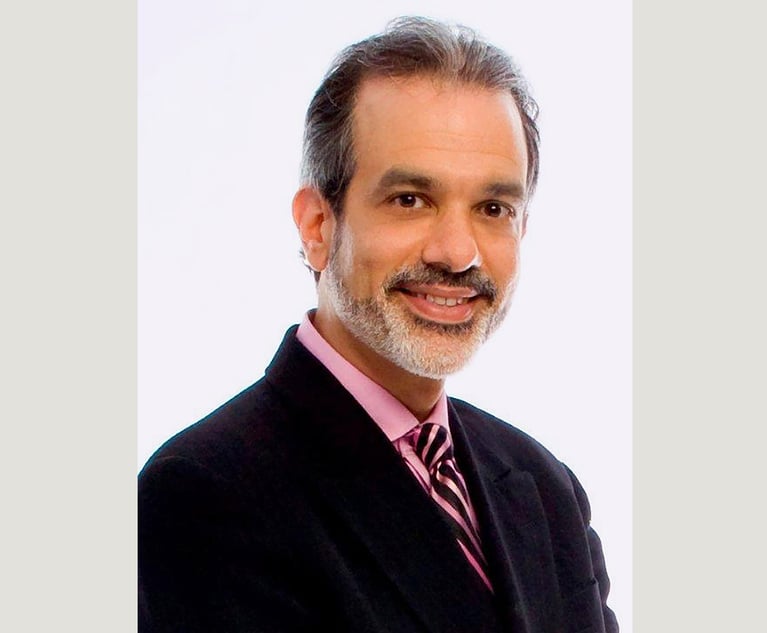Bail Reform's Underappreciated New Element: Non-Monetary Conditions Have the Ability To Pave the Way in Emerging Adult Justice
While the creation of non-monetary conditions may not grab headlines, they work exceptionally well in the burgeoning field of Emerging Adult Justice.
March 08, 2022 at 11:00 AM
10 minute read
 As the criminal justice landscape continues to evolve, historic New York state bail reform laws that went into effect on Jan. 1, 2020 have proven to be true game-changers when it comes to reducing pre-trial incarceration. Under monetary bail—a legal mechanism designed to ensure a defendant's return to court—financial circumstances largely dictate who remains jailed prior to trial. Now, with reforms specifying when monetary bail can be used, there are certain misdemeanors and felonies designated as "non-qualifying" offenses for which monetary bail cannot be set. In addition, embedded in bail reform is a new approach to ensure a defendant's return to court: judges are authorized to impose "non-monetary conditions" that can serve as an alternative to or as an addition to monetary conditions of release pending trial.
As the criminal justice landscape continues to evolve, historic New York state bail reform laws that went into effect on Jan. 1, 2020 have proven to be true game-changers when it comes to reducing pre-trial incarceration. Under monetary bail—a legal mechanism designed to ensure a defendant's return to court—financial circumstances largely dictate who remains jailed prior to trial. Now, with reforms specifying when monetary bail can be used, there are certain misdemeanors and felonies designated as "non-qualifying" offenses for which monetary bail cannot be set. In addition, embedded in bail reform is a new approach to ensure a defendant's return to court: judges are authorized to impose "non-monetary conditions" that can serve as an alternative to or as an addition to monetary conditions of release pending trial.
While the creation of non-monetary conditions may not grab headlines, they work exceptionally well in the burgeoning field of Emerging Adult Justice. This recent age-based movement in criminal justice reform extends protections for justice-involved youth ages 18 to 24 years. Now that "Raise the Age" legislation is in full effect—successfully transitioning most 16- and 17-year-olds out of the adult court system—the time is ripe to develop strategies to provide equitable outcomes for older youth in the New York courts.
With recent scientific studies confirming that the brain does not fully mature until a person is approximately 25, it is axiomatic that many Emerging Adults are often impulsive and incapable of foreseeing the consequences of their actions. Pivotally, during this critical developmental stage of independence, justice-involved Emerging Adults often become disconnected from the positive resources and services available within their communities and often miss out on crucial opportunities to better their life situations. As a result, this group of justice-involved Emerging Adults is best served when matched to community service providers who can offer support in areas such as mental health, substance abuse, education, employment, and mentoring.
This content has been archived. It is available through our partners, LexisNexis® and Bloomberg Law.
To view this content, please continue to their sites.
Not a Lexis Subscriber?
Subscribe Now
Not a Bloomberg Law Subscriber?
Subscribe Now
NOT FOR REPRINT
© 2025 ALM Global, LLC, All Rights Reserved. Request academic re-use from www.copyright.com. All other uses, submit a request to [email protected]. For more information visit Asset & Logo Licensing.
You Might Like
View All
'Careless Execution' of Presidential Pardons Freed Convicted Sex Trafficker, US Judge Laments

Two More Victims Alleged in New Sean Combs Sex Trafficking Indictment

'You Became a Corrupt Politician': Judge Gives Prison Time to Former Sen. Robert Menendez for Corruption Conviction
5 minute read
'It's a Matter of Life and Death:' Ailing Harvey Weinstein Urges Judge to Move Up Retrial
Trending Stories
- 1The Law Firm Disrupted: Scrutinizing the Elephant More Than the Mouse
- 2Inherent Diminished Value Damages Unavailable to 3rd-Party Claimants, Court Says
- 3Pa. Defense Firm Sued by Client Over Ex-Eagles Player's $43.5M Med Mal Win
- 4Losses Mount at Morris Manning, but Departing Ex-Chair Stays Bullish About His Old Firm's Future
- 5Zoom Faces Intellectual Property Suit Over AI-Based Augmented Video Conferencing
Who Got The Work
J. Brugh Lower of Gibbons has entered an appearance for industrial equipment supplier Devco Corporation in a pending trademark infringement lawsuit. The suit, accusing the defendant of selling knock-off Graco products, was filed Dec. 18 in New Jersey District Court by Rivkin Radler on behalf of Graco Inc. and Graco Minnesota. The case, assigned to U.S. District Judge Zahid N. Quraishi, is 3:24-cv-11294, Graco Inc. et al v. Devco Corporation.
Who Got The Work
Rebecca Maller-Stein and Kent A. Yalowitz of Arnold & Porter Kaye Scholer have entered their appearances for Hanaco Venture Capital and its executives, Lior Prosor and David Frankel, in a pending securities lawsuit. The action, filed on Dec. 24 in New York Southern District Court by Zell, Aron & Co. on behalf of Goldeneye Advisors, accuses the defendants of negligently and fraudulently managing the plaintiff's $1 million investment. The case, assigned to U.S. District Judge Vernon S. Broderick, is 1:24-cv-09918, Goldeneye Advisors, LLC v. Hanaco Venture Capital, Ltd. et al.
Who Got The Work
Attorneys from A&O Shearman has stepped in as defense counsel for Toronto-Dominion Bank and other defendants in a pending securities class action. The suit, filed Dec. 11 in New York Southern District Court by Bleichmar Fonti & Auld, accuses the defendants of concealing the bank's 'pervasive' deficiencies in regards to its compliance with the Bank Secrecy Act and the quality of its anti-money laundering controls. The case, assigned to U.S. District Judge Arun Subramanian, is 1:24-cv-09445, Gonzalez v. The Toronto-Dominion Bank et al.
Who Got The Work
Crown Castle International, a Pennsylvania company providing shared communications infrastructure, has turned to Luke D. Wolf of Gordon Rees Scully Mansukhani to fend off a pending breach-of-contract lawsuit. The court action, filed Nov. 25 in Michigan Eastern District Court by Hooper Hathaway PC on behalf of The Town Residences LLC, accuses Crown Castle of failing to transfer approximately $30,000 in utility payments from T-Mobile in breach of a roof-top lease and assignment agreement. The case, assigned to U.S. District Judge Susan K. Declercq, is 2:24-cv-13131, The Town Residences LLC v. T-Mobile US, Inc. et al.
Who Got The Work
Wilfred P. Coronato and Daniel M. Schwartz of McCarter & English have stepped in as defense counsel to Electrolux Home Products Inc. in a pending product liability lawsuit. The court action, filed Nov. 26 in New York Eastern District Court by Poulos Lopiccolo PC and Nagel Rice LLP on behalf of David Stern, alleges that the defendant's refrigerators’ drawers and shelving repeatedly break and fall apart within months after purchase. The case, assigned to U.S. District Judge Joan M. Azrack, is 2:24-cv-08204, Stern v. Electrolux Home Products, Inc.
Featured Firms
Law Offices of Gary Martin Hays & Associates, P.C.
(470) 294-1674
Law Offices of Mark E. Salomone
(857) 444-6468
Smith & Hassler
(713) 739-1250






